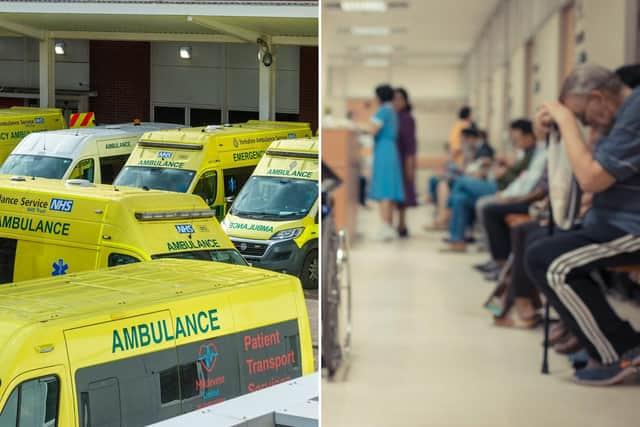'Enormous pressure' on Leeds hospitals as nearly all of city's 1,700 beds taken by patients amid flu and Covid outbreaks
and live on Freeview channel 276
The most up-to-date figures show during the week covering December 26 to January 1, the average number of beds occupied by patients was a staggering 1,664.
The hospital had a total of 1,711 beds, which means 97.3% were taken, according to the data released by NHS England for Leeds Teaching Hospitals NHS Trust, which runs St James’ Hospital and Leeds General Infirmary.
Advertisement
Hide AdAdvertisement
Hide AdAt Mid Yorkshire Hospitals NHS Trust, which includes Pinderfields Hospital in Wakefield, a total of 968 out of 1,040 beds were taken - an occupancy rate of 93%.


It comes after hospital bosses in Leeds and Wakefield issued a crisis warning at the end of December. Hospital bosses said A&E departments were experiencing “extremely high levels of demand” as Covid, flu and staff shortages piled more pressure onto buckling NHS services.
Some planned surgery was cancelled as a result of the influx in patients, to prioritise urgent and emergency surgery as the NHS warned that during busy times, it “needs families and friends to support their loved ones more than usual”, by offering extra help with arranging transport home or collecting their medicines.
NHS national medical director, Professor Sir Stephen Powis, said rising cases flu and Covid in England was putting hospitals under significant strain.
Advertisement
Hide AdAdvertisement
Hide AdHe said: “We knew this winter would be one of the most difficult in the history of the NHS and I want to thank staff for all their hard work in caring for and treating so many patients while dealing with record demand on services, including the enormous pressure from flu and covid. The plans we announced last autumn will help ensure we are in the best place possible to provide care for patients at this incredibly challenging time, with extra call handlers in place, community services established to help keep people out of hospital where possible and we’re also continuing to make good progress to put the equivalent of 7,000 extra beds in place by March.
“It remains vital that people make the most of services like 111 online and as ever, only use 999 in an emergency, and it’s also crucial that those who are eligible come forward for flu and covid vaccines as soon as possible.”
A Department of Health and Social Care spokesperson said the Government "recognised" the pressures the NHS was facing and that it was "working tirelessly to ensure people get the care they need".
The spokesperson added: “This includes investing an additional £500 million to speed up the safe discharge of patients from hospital, creating the equivalent of 7,000 more beds nationally and establishing 24/7 data driven system control centres in every local area to manage demand and capacity. There are record numbers of nurses and doctors working in the NHS – with almost 4,700 more doctors and over 10,500 more nurses compared to October 2021.”